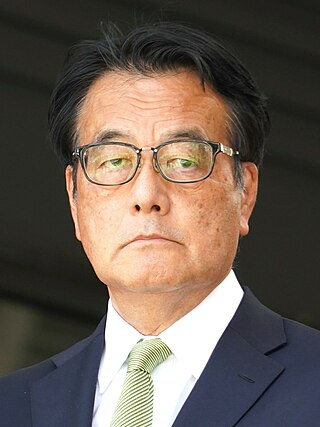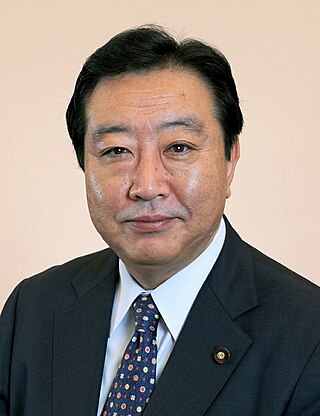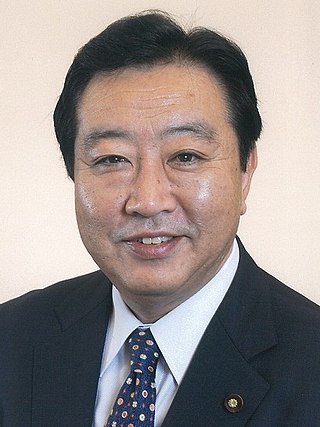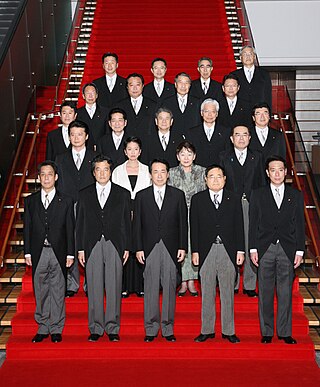
The Democratic Party of Japan was a centrist to centre-left, liberal or social-liberal political party in Japan from 1998 to 2016.

Naoto Kan is a Japanese former politician who served as Prime Minister of Japan and President of the Democratic Party of Japan (DPJ) from June 2010 to September 2011.

Ichirō Ozawa is a Japanese politician and has been a member of the House of Representatives since 1969, representing the Iwate 3rd district. He is often dubbed the "Shadow Shōgun" due to his back-room influence.

Katsuya Okada is a Japanese politician who was Deputy Prime Minister of Japan from January to December 2012. A member of the House of Representatives of Japan, he was the President of the Democratic Party, and previously of the Democratic Party of Japan. He also served as Secretary-General of the DPJ three times. During the DPJ's period in government he was Foreign Minister of Japan.

Hirohisa Fujii was a Japanese politician who was a member of the House of Councillors from 1977 to 1986, and of the House of Representatives from 1990 to 2012. He served two terms as Minister of Finance, and as Secretary General of the Liberal Party and the Democratic Party of Japan.

Seiji Maehara is a Japanese politician who has been a member of the House of Representatives of Japan since 1993. He founded and led the political party, Free Education for All, before its merger into Nippon Ishin no Kai on 3 October 2024.

Yukio Hatoyama is a Japanese politician who served as Prime Minister of Japan and Leader of the Democratic Party of Japan from 2009 to 2010. He was the first Prime Minister from the modern Democratic Party of Japan.

Akira Nagatsuma is a Japanese politician of the Constitutional Democratic Party of Japan (CDP), a member of House of Representatives in the Diet. Nagatsuma is currently the deputy leader and the head of the Tokyo chapter of the CDP. He had served as the Minister of Health, Labour and Welfare in the Hatoyama and Kan administration. He came to prominence when he reported missing records of public pension plans. A native of Nerima, Tokyo and graduate of Keio University, he was elected for the first time in 2000 after unsuccessful runs in 1995 and 1996.

Yoshihiko Noda is a Japanese politician. He is the current leader of the Constitutional Democratic Party of Japan (CDP), and has been a member of the House of Representatives since 2000. From 2011 to 2012, he was the Prime Minister of Japan.

Sumio Mabuchi is a Japanese politician and a member of the House of Representatives in the Diet.

Yukio Edano is a Japanese politician who served as the leader of the Constitutional Democratic Party of Japan from its formation in 2017 until 2021.

General elections were held in Japan on 16 December 2012. Voters gave the Liberal Democratic Party a landslide victory, ejecting the Democratic Party from power after three years. It was the fourth worst defeat suffered by a ruling party in Japanese history.

The 13th Democratic Party of Japan leadership election was held on 16 May 2009 after the incumbent party leader Ichirō Ozawa announced that he would resign in early May 2009. Ozawa had been expected to lead the DPJ into a possible election victory over the long-time incumbent Liberal Democratic Party later in 2009, but a corruption scandal had forced him to resign in order to save the party's chances.

House of Councillors elections were held in Japan on July 11, 2010. In the previous elections in 2007 the Liberal Democratic Party (LDP) had lost its majority to the Democratic Party (DPJ), which managed to gain the largest margin since its formation in 1996. The House of Councillors is elected by halves to six-year terms. The seats up for election in 2010 were last contested in the 2004 election.

The September 2010 Democratic Party of Japan leadership election was held on 14 September 2010 after the incumbent party President Naoto Kan who served the remain of Yukio Hatoyama's term came to an end at the same time Kan bets for his election. On August 26, 2010 the "Shadow Shōgun" Ichirō Ozawa declared his candidacy to challenge Kan for leadership and premiership.

The 2011 Democratic Party of Japan leadership election took place on August 29, 2011. The election chose Yoshihiko Noda as the successor to Naoto Kan as president of the Democratic Party (Minshutō) of Japan. The designation of the new party president as prime minister in the Diet took place on August 30; Kan remained as acting prime minister until his successor's formal appointment ceremony with the Emperor. In June 2011, Kan had announced to resign once three conditions have been met: passage of the second extra budget for fiscal 2011, passage of a bill to promote the use renewable energy and passage of a bill to issue new debt covering bonds. The extra budget was passed in July; after an agreement with the opposition was struck on reforming the child allowance introduced by the Democratic Party, the renewable energies bill and the bond ceiling increase passed through the Diet on August 26, 2011.

Banri Kaieda is a Japanese politician who is serving as the Vice Speaker of the House of Representatives of Japan since 2021. A member of the House of Representatives of Japan, he also served as the President of the Democratic Party of Japan between 2012 and 2014. He was a former minister in the Kan cabinet.

The Kan Cabinet was the cabinet governing Japan from June 2010 to September 2011 under the leadership of Prime Minister Naoto Kan, who came into power after winning the DPJ leadership election in June 2010. The Kan Cabinet oversaw the response to the aftermath of the 2011 Tōhoku earthquake and tsunami and the scaling-down of Japan's nuclear energy dependence following the nuclear disaster at TEPCO's Fukushima Daiichi nuclear power plant.

The Next Cabinet is the de facto shadow cabinet of Japan. First used in 1999, it was created by the Democratic Party of Japan while they were the country's main opposition party to the governing coalition of the Liberal Democratic Party and Komeito. Next Cabinets have since been formed by presidents of the DPJ's 2016 successor and the Constitutional Democratic Party.




















